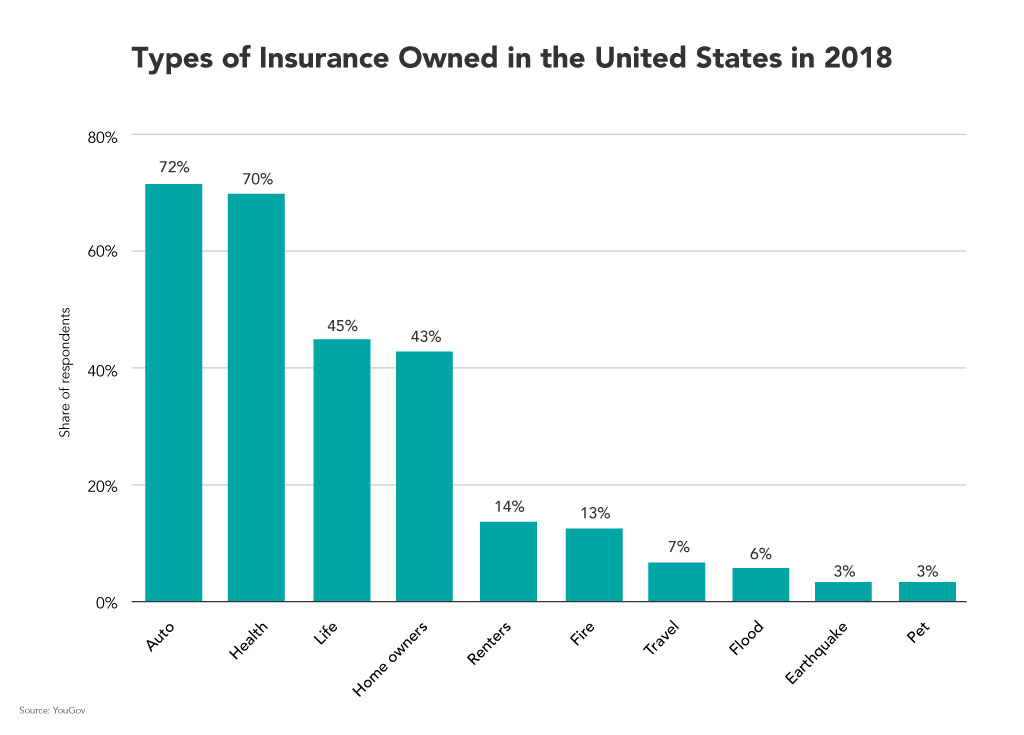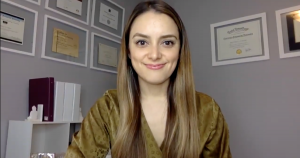There are an overwhelming amount of insurance options on the market. While thorough coverage is important, it’s also possible that you can have too much coverage. Paying too much money for insurance could leave you financially vulnerable in other areas, like your emergency fund or retirement savings. How do you know what types of insurance are absolutely necessary, and what’s superfluous?
To learn about different types of insurance, continue reading through.
- Health Insurance
- Car Insurance
- Homeowners or Renters Insurance
- Life Insurance
- Disability Insurance
1. Health Insurance
What does it cover?
Health insurance covers your necessary medical costs, from doctor’s appointments to surgeries. Along with coverage for illnesses and injuries, health insurance covers preventative care, such as monthly check-ins and tests.
Do you need it?
Health insurance is arguably the most important type of insurance.
A 2016 Kaiser Family Foundation/New York Times survey found that one in five people with medical bills filed for bankruptcy. With a stat like this, investing in health insurance can help you prevent a significant financial hardship.
For example, if you’re a federal employee, you can choose from a variety of healthcare plans on OPM.gov. Or, if you’re an independent contractor, you can look into freelancer insurance to create your own benefits package.
When you’re going to purchase health insurance, consider the following:
- Needs: Young and healthy single persons require less coverage than those with families, the elderly, or persons with chronic health issues. If you think you’re going to be using your insurance frequently, you’ll want to find a plan that has a low deductible and copays.
- Doctors: If you like your doctor, try and find a plan that allows you to keep your current physician.
- Cost: Analyze your budget and determine what you can afford. Remember that plans with higher copays and deductibles also have lower premiums, while plans with high premiums usually have lower copays and deductibles.
You probably don’t need it if…
Every adult should have health insurance. Children are usually covered under one of their parents’ plans.
2. Car Insurance
What does it cover?
There are several different types of car insurance that cover different scenarios, including:
- Liability: Liability insurance comes in two forms: bodily injury and property damage liability. These do not cover the driver or passengers–only pedestrians.
- Personal Injury Protection: This type of coverage will cover medical expenses related to driver and passenger injuries.
- Collision: Collision insurance will cover the cost of the damage to your car if you get into an accident, whether you’re at fault or not.
- Comprehensive: Whereas collision insurance only covers damage to your car caused by an accident, comprehensive insurance covers any car-related damage, whether it’s a tree falling on your car or vandalism from unruly neighborhood kids, for example.
- Uninsured or Underinsured Motorist: This covers you in the event that the person who hits your car does not have enough insurance to cover the damage.
Always be on the lookout for car insurance discounts when you’re shopping for a plan. There are plenty of discounts you may be eligible for to lower your monthly bill, including safe driver, married driver, and multi-car discounts.
Do you need it?
Yes! Every state requires you to have auto insurance if you’re going to drive a vehicle. If you just purchased your first car or have been driving uninsured, it’s time to find a plan with an auto insurance finder, so you have your back covered in the event of an accident.
You probably don’t need it if…
If you don’t own a vehicle or have a driver’s license, you won’t need car insurance.
3. Homeowners or Renters Insurance
What does it cover?
Homeowners insurance covers your home against damage and theft, as well as other perils such as damage to a visitors property, or any costs if someone was injured on your property. It also covers your home’s foundation, roof, and walls, as well as personal property. However, you may need additional insurance to cover natural disasters, like flooding, earthquakes, and wildfires.
Renters insurance covers you against damage or theft of personal items in an apartment, and in some cases, your car. It also covers liability costs if someone was injured in your apartment or if their belongings were damaged or stolen from your apartment. However, renters insurance typically does not cover extremely valuable items, damage from pests, and damage from natural disasters.

Do you need it?
Homeowners insurance is absolutely essential because a home is oftentimes one’s most valuable asset, and is often required by your mortgage lender. Not only is your home covered, but most of your valuables and personal belongings are covered, as well.
Renters insurance isn’t as crucial, unless you have a large apartment that has plenty of valuables. But even if you don’t, know that renter’s insurance is usually very low-cost, so it might be well worth the peace of mind it provides. Our blog post on renters insurance questions can help you decide whether purchasing this type of insurance is right for your situation.
You probably don’t need it if…
You don’t need homeowners insurance if you don’t own a house. Likewise, you won’t need renters insurance if you’re not renting an apartment.
4. Life Insurance
What does it cover?
Life insurance covers costs associated with dying, such as burial and mortuary fees. Life insurance can also help pay off any of your debts, such as your mortgage and loans, or for everyday expenses. If you’re the primary breadwinner of the family, life insurance will also help your family offset lost income. The latter is the main reason why people buy life insurance. It’s important to keep in mind that life insurance expires.
If you pass after the expiration date of your life insurance coverage, your beneficiaries will not receive your death benefit. Additionally, if you make any false claims to your insurer and they find out, they may deny your beneficiary’s claims. For example, if you fail to let your insurer know you smoke and they review your life insurance application for fraud, your beneficiaries can be at risk for not receiving your death benefit.
Do you need it?
Life insurance is the type of insurance that most people want to avoid thinking about. However, it’s incredibly important. If you have a family, you also have a responsibility to make sure they’re provided for in the event that you pass before your time, especially if you have children or if you have a spouse that’s not working. Life insurance will help your family financially cope when you pass, and with it, you can ensure your family will be able to move on financially even when you’re gone.
You probably don’t need it if…
If you’re single and unmarried, you most likely don’t need life insurance, although there are other important types of insurance for singles.
5. Disability Insurance
What does it cover?
Disability insurance is similar to life insurance because it provides financial coverage if something happens to you. If you get injured and aren’t able to work, disability insurance will reimburse you for lost income. Disability insurance can cover permanent, temporary, partial, or total disability. However, it does not cover medical care and services for long-term care.
Do you need it?
The Center for Disease Control and Prevention states that nearly one in four Americans have a disability that impacts major life events, which makes this type of insurance sensible for everyone, even if you’re young and single.
Disability insurance is relatively affordable, but it could provide tremendous financial help if you become disabled for any length of time. You can learn more at Ssa.gov.
You probably don’t need it if:
Children don’t need disability insurance because they have no income. However, you never know when you may become injured or sick, which is why disability insurance can be a good idea, especially if you work in a particularly dangerous job setting.

5 Unnecessary Insurance Policies
There’s lots of insurance you might not need, such as:
- Flight Insurance: Flying is one of the safest modes of travel.
- Life Insurance for Kids: Life insurance exists to replace lost income. Children have no income.
- Accidental Death Insurance: Even the accident-prone should skip this type of insurance. It generally contains so many restrictions, that it’s nearly impossible to collect.
- Disease Insurance: A good health insurance policy is probably a far better investment than trying to cover yourself for every type of ailment that’s out there.
- Mortgage Life Insurance: Here’s another redundant form of insurance. A good life insurance policy with a long term will cover your mortgage in the event of your death.
Should I get pet insurance?
The problem with pet insurance is that it typically doesn’t cover annual vaccinations, spaying, and neutering. Thus, it only becomes valuable if your pet has a serious injury or chronic illness.
However, if your pet is an ingrained part of your family and you’re willing to pay high veterinary costs to treat major illnesses and injuries, pet insurance might be worth the money.
Be Secure, Not Paranoid
Humans have a pretty strong sense of self-preservation, so it’s natural to feel an urge to protect yourself against any and every calamity. Most people would rather pay a little bit of money each month than struggle to come up with a larger amount of money in a time of crisis.
On the flip side, there are lots of people who think they have nothing to worry about, that they probably won’t ever need one of the many insurance types out there.
It’s best to take a stance somewhere in between these two mentalities. You should definitely consider buying all or most of the 5 necessary types of insurance mentioned above. These are the most important insurance types that provide huge financial relief for very realistic scenarios.
Outside of the 5 main types of insurance, you should think carefully before buying any additional insurance. If you pay too much money for insurance, you could significantly restrict your budget, and thus, your quality of life.

Only buy additional insurance policies when there’s a reasonable chance you’ll collect. For instance, if you live in earthquake-prone areas of California, earthquake insurance would be a smart investment. Likewise, flood insurance is recommended if you live somewhere that’s prone to flooding. But even if you’re a frequent flyer, you still probably won’t need flight insurance.
Finally, when buying insurance, always make sure you can afford it. Remember, insurance is meant to protect you and your finances, not hurt them. If you need assistance with budgeting, try using a bill payment tracker which can help you maintain all of your insurance payments so you’ll have a better grip on your personal finances.






